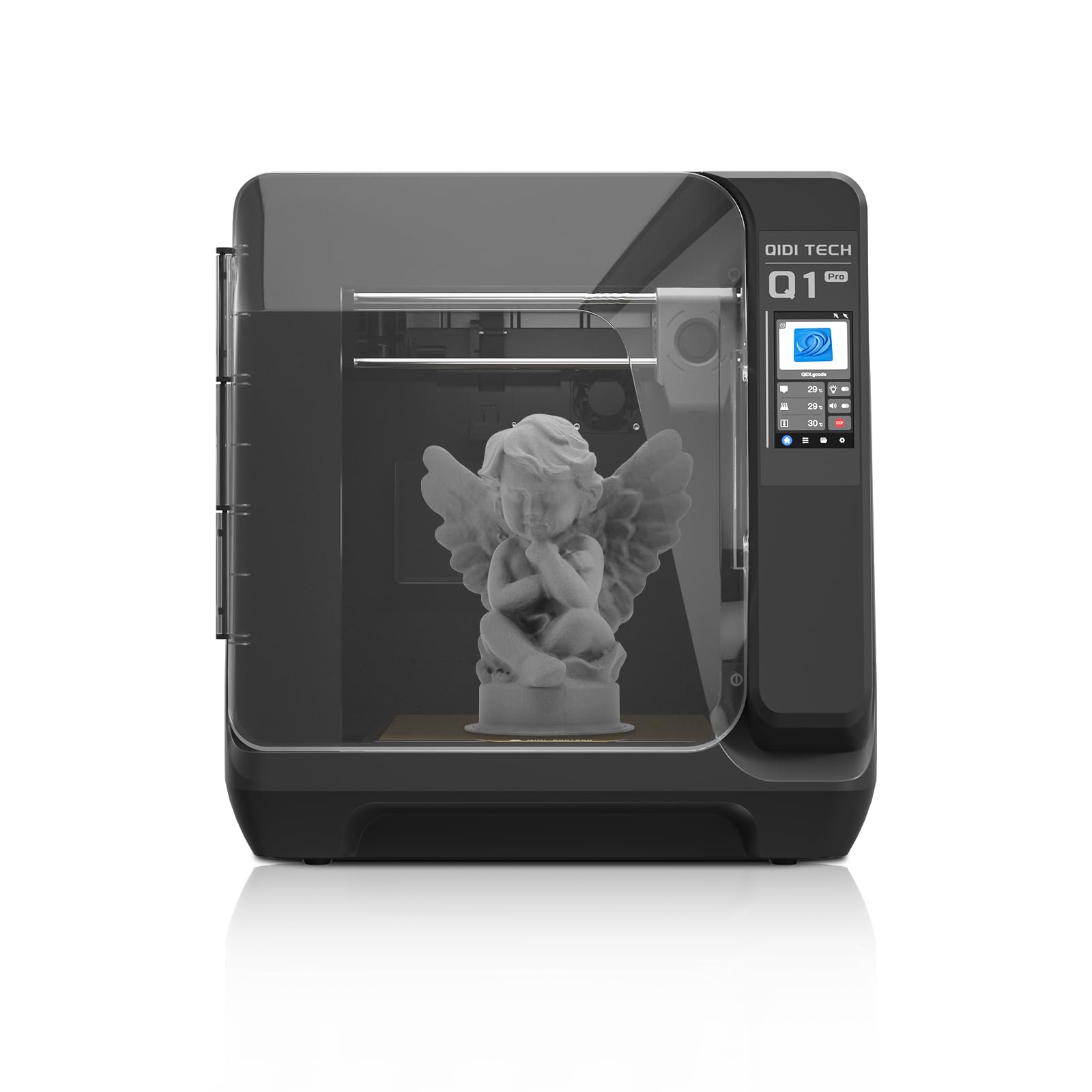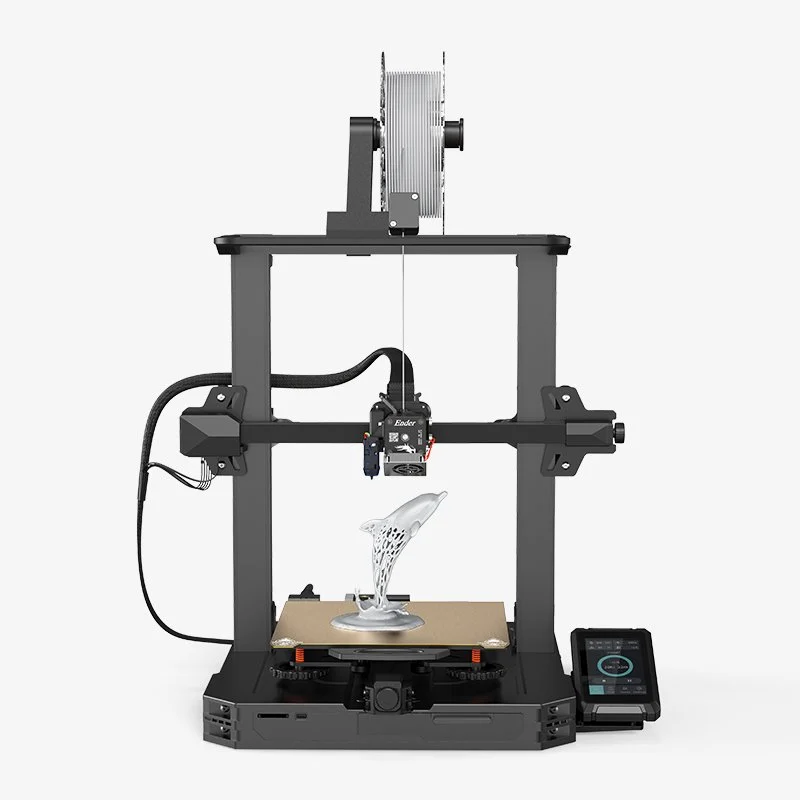Compare Q1 PRO vs Ender 3 S1 PRO
Comparison between the best 3D printers
Choose the best 3D printer at the best price. The cheapest 3D printers are here.
Buy a 3D printer here with 3D Fila.
 |
 |
|
| Model | Q1 PRO[BUY Q1 PRO] |
Ender 3 S1 PRO[BUY Ender 3 S1 PRO] |
| Printing Material | Filament | Filament |
| Buy Filament for QIDI Q1 PRO | Buy Filament forCreality 3D Ender 3 S1 PRO | |
| Estimated price | $449,00 | $499,00 |
| Manufacturer | QIDI | Creality 3D |
| Release Year | 2024 | 2022 |
| Print Volume [mm] | 245x245x245 | 220x220x270 |
| Printer Size [mm] | 467x477x489 | 450x49x620 |
| Weight [kg] | 20 | 8,7kg |
| Power Loss Recovery | YES | YES |
| Enclosed printer | YES | NO |
| Bed Leveling | Automatic | Automatic |
| Filament End Sensor | YES | YES |
| Bed type | Heated | Heated |
| Power supply system | Direct Drive | Direct Drive |
| Standard nozzle | 0,4 | 0,4 |
| Maximum Nozzle Temperature [°C] | 350 | 300 |
| Maximum Bed Temperature [°C] | 120 | 110 |
| Maximum printing speed [mm/s] | 600 | 150 |
| Filament holder | YES | YES |
| Camera for supervision | YES | YES |
| Recommended filaments | PLA、ABS、ASA、PETG、TPU、PC、PA、PA-CF、PET-CF、PAHT-CF etc. | PLA, PETG |
| Recommended slicers | QIDI Slicer/Cura/Simplify 3D/ORCA/PRUSA Slicer | Cura, Simplify, Slic3r |
| Maximum Resolution [mm] | 0,1 | 0,1 |
| Processor | Cortex-A53,64-bit Processor | |
| Display | Touchscreen 4,3'' | Display touchscreen 4,3'' |
| Power Supply | 350 W | 350 |
| Connectivity | WiFi/USB Flash Drive/Ethernet Cable | SD |
| Operating systems | Windows, Linux, Macbook | Windows, Mac, Linux |
| Date of registration in the system | 2024-07-09 | 2022-10-11 |
| Release date | 2024 | 2022 |
| Extra features | The QIDI Q1 Pro 3D printer stands out for its Core XY structure and heating chambers that reach up to 60ºC, ideal for advanced materials such as ABS and Nylon. It features Klipper firmware, an automatic leveling system, a high-flow extruder with a double metal nozzle and a hotend that reaches 350ºC. It offers connectivity via Wi-Fi, USB and Ethernet, as well as a 1080p camera for remote monitoring and an intuitive touchscreen for easy operation. | Creality's Ender 3 S1 PRO is an innovation in the Ender 3 series, featuring a Sprite Pro Extruder capable of reaching 300°C and dual lead screws on the Z axis, ensuring greater stability and print quality. Its PEI-coated print bed, combined with CR-Touch automatic leveling, provides excellent adhesion and ease of part removal. The user interface, via a 4.3-inch touchscreen, offers intuitive and efficient control, although it has some limitations regarding the handling of long file names and navigation. The well-designed extruder ensures effective cooling and handling of various filaments, although there may be a slight ghosting effect at high speeds due to its weight. This printer represents a balance between technological advances and operational challenges, remaining faithful to the quality expected of the Ender line. |
| Support for multiple colors and materials (AMS and CFS) | NO | NO |
Notes * |
||
| Cost-benefit | 8 / 10 | 7 / 10 |
| Hardware | 5.4 / 10 | 2.8 / 10 |
| Tela | . | . |
| Print volume | 3 / 10 | 3 / 10 |
| Performance | 5 / 10 | 1 / 10 |
| [BUY Q1 PRO] | [BUY Ender 3 S1 PRO] |
Conclusion |
| In comparing the QIDI Q1 PRO and the Creality Ender 3 S1 PRO, several key factors emerge that can influence a buyer’s decision. The QIDI Q1 PRO, priced slightly lower, is a newer model released in 2024, boasting innovative features such as a Core XY structure, a higher maximum nozzle temperature of 350°C, and an extensive array of supported materials. Its enclosed design enhances print quality and reliability, particularly for advanced materials like ABS and Nylon. With a maximum printing speed of 600 mm/s, it outperforms the Ender 3 S1 PRO significantly, making it a great option for users looking for speed and versatility in material handling. Additionally, the Q1 PRO's connectivity options and built-in camera for monitoring further enhance its user-friendliness, making it a commendable choice for both beginners and experienced users. On the other hand, the Creality Ender 3 S1 PRO, while an older model from 2022, offers solid performance with a maximum nozzle temperature of 300°C and a reliable build quality that the Ender series is known for. Its design includes dual lead screws for improved stability, and though it supports fewer filament types compared to the QIDI Q1 PRO, it handles PLA and PETG well. In terms of cost-benefit analysis, the QIDI Q1 PRO edges out with a better score due to its enhanced hardware capabilities and performance metrics. The Ender 3 S1 PRO, while still a respected model, offers a more basic feature set and slightly lower print speeds, impacting its overall score. Ultimately, the choice between the two will depend on the user's specific needs: for those prioritizing speed, versatility, and advanced features, the QIDI Q1 PRO presents a compelling option. Conversely, those looking for a reliable and tested printer at a slightly lower price might find the Ender 3 S1 PRO to be sufficient for their needs. |

